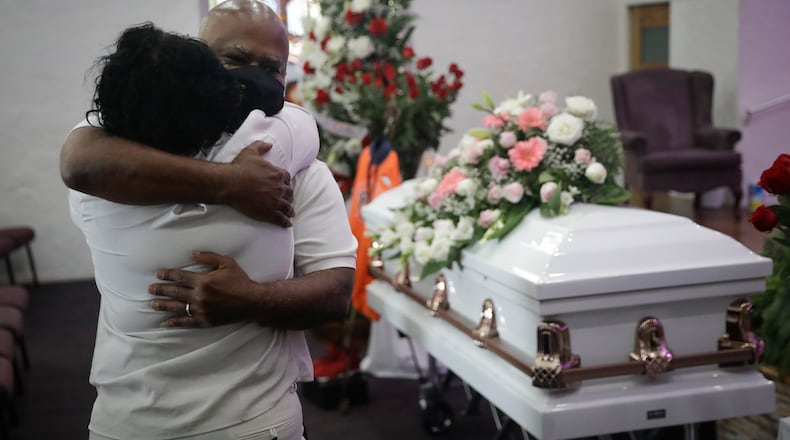Approximately $2 billion was provided to FEMA through the Coronavirus Response and Relief Supplemental Act of 2021 to reimburse individuals and households for COVID-19 related funeral expenses incurred between Jan. 20 and December 2020, according to FEMA’s website.
Assistance is limited to a maximum of $9,000 per funeral and a maximum of $35,500 per application per state, territory or Washington, D.C.
COVID-19 has killed more than 550,000 Americans, compelling families to cover the expenses of their relative’s untimely death. Ohio has seen 18,327 deaths as of Tuesday including Montgomery (984), Greene (233), Miami (211), Clark (287), Warren (291) and Butler (566) counties.
Financial costs for funerals can vary, depending on the funeral home and the type of service and burial, according to Devin Woodyard, president of the Ohio Funeral Directors Association.
The average cremation and burial runs about $3,000 to $5,000, and burial with a casket about $7,000 to $9,000, Woodyard told this news outlet.
“I think it (the funeral Assistance Program) will help a lot of families who have lost one or two or multiple family members, as I know some have,” he said.
The FEMA reimbursement helps with not just the cost of burial, but also other expenses such as flowers, obituaries, honorariums for clergy, headstones and other expenses, Woodyard said.
Funeral homes keep a record of all such expenses, said Woodward, who is vice president of the O.R. Woodyard Co. Funeral & Cremation Services.
“Today we probably had five or six phone calls of people asking, ‘Can I get a copy of that bill?” or ‘Can I get a copy of that canceled check?’ or a copy of the insurance paperwork,” he said. “That’s something that every funeral home would be able to provide.”
Funeral directors can answer questions about the program, but families must be the one to apply, Woodyard said.
FEMA says expenses for funeral services and interment or cremation typically include, but are not limited to:
· Transportation for up to two individuals to identify the deceased individual
· Transfer of remains
· Casket or urn
· Burial plot or cremation niche
· Marker or headstone
· Clergy or officiant services
· Arrangement of the funeral ceremony
· Use of funeral home equipment or staff
· Cremation or interment costs
· Costs associated with producing and certifying multiple death certificates
· Additional expenses mandated by any applicable local or state government laws or ordinances.
Those who qualify can complete an application by calling FEMA’s COVID-19 Funeral Assistance Line Number at 844-684-6333 (TTY: 800-462-7585).
Hours of operation are 9 a.m. to 9 p.m. Monday through Friday. Online applications are not being accepted. Detailed information is available at www.tinyurl.com/funeralassistance.
Those approved for COVID-19 Funeral Assistance will receive a check by mail or funds by direct deposit, depending on which option was chosen when applying for assistance, FEMA said.
U.S. Rep. Mike Turner, R-Dayton, this week encouraged affected Ohio families to apply, and offered his office as a resource.
“In an effort to assist grieving families, last year I voted for COVID relief legislation that established a program to help,” Turner said in a release. “I encourage Ohio families who faced such an unbearable loss and financial burden due to COVID to take advantage of this program, and my office stands by ready to assist.”
Turner’s Dayton office can be reached at 937-225-2843.
FEMA on Tuesday said it was experiencing high-call volume on its Funeral Assistance phone line, which was causing some technical issues. It encouraged callers to try again later if they get a busy signal or their call did not connect and emphasized that there is no deadline to apply.
Who is eligible
To be eligible for COVID-19 funeral assistance, the FEMA policy states:
- The applicant must be a U.S. citizen, non-citizen national, or qualified alien who incurred funeral expenses after Jan. 20, 2020 for a death attributed to COVID-19.
- If multiple individuals contributed toward funeral expenses, they should apply under a single application as applicant and co-applicant. FEMA will also consider documentation from other individuals not listed as the applicant and co-applicant who may have incurred funeral expenses as part of the registration for the deceased individual.
- An applicant may apply for multiple deceased individuals.
- The COVID-19-related death must have occurred in the United States, including the U.S. territories and the District of Columbia.
- This assistance is limited to a maximum financial amount of $9,000 per funeral and a maximum of $35,500 per application.
- Funeral assistance is intended to assist with expenses for funeral services and interment or cremation.
SOURCE: FEMA
About the Author

